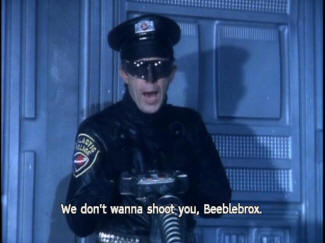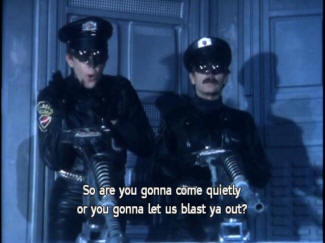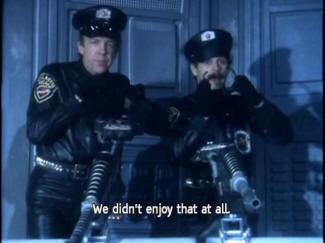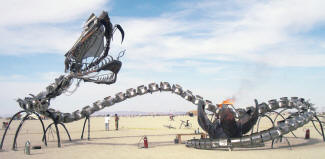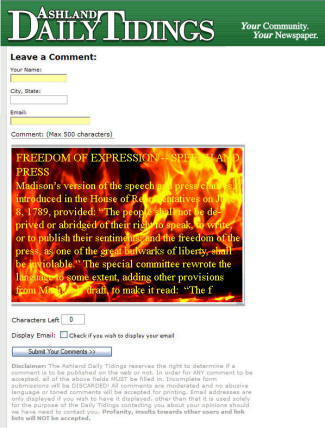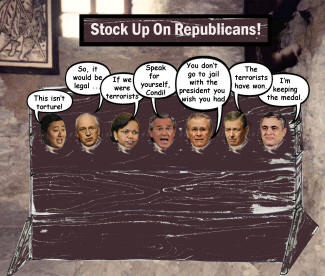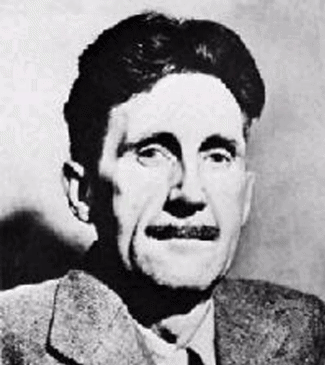WEREWOLVES IN ASHLAND, by Charles Carreon Werewolves in Ashland, by Joshua CarreonI. The Werewolf Expert
Werewolves in Ashland, by Joshua CarreonI. The Werewolf Expert“It is not true in every case that the werewolf becomes a cannibal on the night of the full moon.” As he wrote these words, Professor Probst realized that statement contradicted the expressed view of many experts, but he was sure it was true. Were he unsure, he would not have recorded it in his diary. He had a rule about what he wrote in his diary, a document that he meant to serve as a scientifically accurate record of his observations. On the inside front cover he had written as a reminder the phrase: “Clear observation – No speculation.” The rule had served him well. It was necessary to maintain psychic hygiene, especially when dealing with matters involving the supernatural, as Probst routinely did. He was, after all, the world’s greatest living expert on werewolves.
Probst was so dedicated to his study of lycanthropy that he hadn’t noticed when the community college where he had taught in California eliminated all of his teaching hours and took him off the payroll. He didn’t figure it out until he went looking for a class schedule, and discovered his name wasn’t on it. He had moved to Ashland, Oregon eleven years earlier, and had seen plenty of evidence of werewolves in the area, more than once observing the telltale signs of lycanthropism among certain members of the populace.
In addition to its unusually large werewolf population, Ashland was an excellent place to network with other supernatural explorers, although there were some phonies at work. Housing was a problem, and particularly so during nights of the full moon, when cops made use of the additional light to hunt up homeless people flaunting the law against having no money. Which is why Probst’s old VW van was pulled up under the spreading arms of a huge cedar that was dripping wet on this rainy summer morning, and Probst was sitting up in his sleeping bag, writing in his thirteenth composition notebook on the secret lives of werewolves. The other twelve volumes were stored neatly in an orange crate to his left, an anachronism from a prior era decorated with the bright illustration of a buxom caramel-skinned woman with blue-black hair spilling from under her red bandana, bearing a basket of oranges over her left shoulder. Probst had preserved the crate, a relic from the era when oranges were still shipped in crates, in memory of a girlfriend who had somewhat resembled the attractive fruit picker. Carla had been her name. Or perhaps Marla.
Perhaps her name was Marla, he mused, then abandoned his daydreaming about her caramel skin, and resumed his writing. “The full moon transformation does not affect all lycanthropes in the precise same way, and in certain places and times, far from being considered grotesque, the wolfmen have been considered a form of deviant nobility.” Probst had been broadening his searches on the Internet. New information appeared all the time. He would do more research today down at the library. He would continue observing the local werewolves. At this stage in his research, he needed to dig into the fieldwork -- stalk them in their nocturnal haunts, watch them surrender to animal abandon, and record it all in his careful, draftsman-style handwriting. His intuition told him that werewolves might be resurging because of global warming, that was paradoxically increasing precipitation and snowfalls in the area, but he wasn’t ready to write it in his notebook. He needed evidence. This next full moon, if it wasn’t raining again. His eyes fixed in the middle distance, he grasped the silver bullet that hung ‘round his neck -- a keepsake from his wanderings in the Balkans. He had no ill will toward the lycanthropic race, indeed he suspected he was romantically attracted to them, but the weighty cartridge comforted him on lonely nights when the howling and barking got too close to the van. Deviant nobility – he liked that term. He smiled and chewed the end of his pencil.
Probst heard a rap on the side of the van, and looked up to see his friend Rodney smiling in the driver side window. He probably wanted to take a walk. Rodney lived in a truck, and took long walks as a way of keeping himself occupied and exercised. Rodney didn’t believe in werewolves, but that was all right with Probst. Rodney played chess and published a poetry magazine on an occasional basis. He climbed inside the front seat of the van, and pulled the door shut.
“Whaddaya workin’ on, Probst, your life story? Better get some exercise, or it’ll be a short one.” Rodney laughed as if he’d just taken Probst’s pawn in a chess game, and pushed ahead with his usual bravado. “C’mon, let’s take a walk, amigo!”
“You didn’t bring me any coffee, man,” replied Probst. “It’s all wet. I’ll have to put on my rain gear.”
“Don’t worry, it’s barely drizzling. Live dangerously, or better yet, use an umbrella, professor,” said Rodney.
“I’ll just suit up,” said Probst. Probst pulled corduroy pants over his long underwear, a plaid coat over his flannel shirt, and some thick woolen socks over his feet, while Rodney launched into a monologue about local politics. Rodney didn’t always require responses to his statements, and Probst had gotten the hang of nodding at the right time a long time ago. So he and Rodney got along perfectly well. They walked out from under the big, dripping cedar, onto the little gravel track Probst had found leading up to his hideout, and down onto the road.
Probst had set up his squat with careful attention to “the three S’s” – “shape, shadow and size,” an old military acronym he’d picked up during his service in Nam as a spotter for the B-52s that pummeled the Ho Chi Minh Trail every night with high explosives bombs like seeds that trickled from the devil’s overflowing maw. To identify rebel supply and construction locations on aerial photographs, the places where huge Russian and Chinese bulldozers and trucks would lie hidden during the night, spotters searched for unusual shapes and shadows, and objects of unusual size. Anything square or blocky, or casting straight line shadows, or just too damn big to be a natural form, would be marked for destruction.
Probst had first become aware of werewolves in Nam, when he realized that his sergeant was one. Racine was the sergeant’s name, and Racine’s secret was no secret to anyone. One night when their platoon was in a forward position separated from the rest of G Company, the huge Vietnamese full moon came up over the Mekong River, he underwent the classic transformation in front of the entire squad. Racine was a decent fellow, actually the best kind of sergeant, and after the event he remembered nothing, so everyone covered for him, even though the scene was weirder than anything you’d see in Apocalypse Now.
It started with Racine heating up a cup of instant coffee in his canteen cup over a little sputtering fire he’d made from a pinch of plastic explosive. Usually by this hour of the night, everyone would’ve loosened up with a heroin-laced spleef, but the squad’s drug dealer had been injured by a booby trap a week before and nobody else had been able to score since he got helicoptered out. So they were all straight except for a couple of the guys from California, who had a stash of acid. That stuff didn’t agree with Probst, so he was just jonesin’ for a joint when Racine started coughing.
Nobody said anything until the coughing had kept up for a couple of minutes, and Racine was doubled over in a squat, his head between his knees, hacking in a hoarse voice deep in his throat. Then all of a sudden he whipped his head up and snapped his whole body into a wolf posture, his mouth tilted open to the sky, and emitted a howl that could’ve come out of the mouth of a timber wolf. Then he kept doing it for so long that even the acid heads stopped laughing and got scared, confused looks on their faces. What the fuck was Sarge doing, howling like a goddamned coyote? Then the huge moon came up over the rim of the jungle foliage and cast a ray of light on Racine. The sergeant’s face was shockingly transformed, as was his entire body. His shoulder, neck and arm muscles were bulging with strength, his tongue seemed elongated, his canines shone brightly, and his facial muscles had shaped themselves into such a doglike resemblance that the acid heads freaked out, shouting simultaneously, “He’s a fucking werewolf!” and reached for their weapons.
Probst liked ready firepower, and grunts could carry any sidearm they wanted. He’d opted for a sawed-off twelve-gauge pump shotgun. He’d carved the stock into a pistol grip, and loaded the magazine with alternating deer slugs and double-odd shot. The slugs would punch through twelve inches of wet phone book, and the shot would melt the skin off bones. Probst thought of it as his personal shield, and so far nobody had gotten past it. When Probst racked the pump and leveled it at the trippers, fumbling with the safeties on their M-16s, he got their close attention.
Probst’s head shook lightly in the moonlight as he assured the men in a calm voice, “Sarge is on a bummer. Stand down, gentlemen. I’ll take care of him.” A gentle wave of the sawed-off reassured them that Probst was in charge, and the acid heads released their automatic rifles.
“It’s cool, man,” said Retro, a black nineteen-year old from Pomona who looked like he was comin’ down fast off the acid buzz.
“Yeah, cool,” echoed Lenny, the second tripper, a Pacific Palisades boy who seemed far from sure that anything was cool.
The third tripper, Carlito, a Latino from Silverlake in LA, said nothing, still riveted on the sight of Racine, whose howls continued to split the night.
Then Lt. Darcy showed up, pulled away from the warm arms of his underage prostitute by the sergeant’s ear-splitting howls. Flashing his light around, he saw Probst with his leveled gun, the nervous acid heads with eyes glittering, and Racine howling like Rin Tin Tin mourning the death of Lassie, turned right around, and walked into his tent. Then he came back out with his service .45 in his hand and walked over to Probst.
In a breathy voice loaded with good whiskey, Darcy whispered in Probst’s ear in his cultured southern drawl, “What the fuck is going on here? Is Racine high, or what?”
“I have no idea. I’m just watching. Why don’t you go back to bed Lieutenant. I’ll see this through.” Probst kept his eyes on the acid heads while talking to Darcy.
Darcy continued his twangy whispering, “Perhaps it hasn’t occurred to you, Corporal, that this might give away our position to the enemy.”
“Yes, I did, but I’m hoping they’ll think it’s a dog, and the US Army rarely operates with canine patrols.”
“Can’t you shut him up?”
“He just started a minute ago. I’m hoping he’ll shut up soon. If he doesn’t maybe we’ll have to call for a medic. Gimme a little bit.”
Then, something even stranger happened. Another howl burst out of the jungle to Probst’s right, and it sounded remarkably near. Then, in an eerie chorus, the howls began to sound all around them, blending with Racine’s into a moonlight serenade of soaring unity. The acid heads looked around and up at the sky in wonder, and started howling, too, laughing their asses off as a war zone turned into a primeval forest. As the moon rose higher, the scene of pandemonium unfolded, Probst lowered his sidearm and turned to Darcy, nodding as if he knew something. Darcy sullenly returned to his tent, the embraces of his bedtime companion, as the jungle around them echoed with an ever-increasing number of howling voices. In the morning, Racine was himself again, sleeping like a baby next to a canteen-cup of cold coffee.
II. Saigon DaysThe incident with Sgt. Racine had been a one-time event that never recurred. Although not a doper on a regular basis, from then on, Racine slept through every full-moon night, retiring early to his tent with two shots of vodka laced with a dose of pharmaceutical morphine. Racine was a lifer, then in his early fifties. He had stormed beaches in the South Pacific and served in the postwar occupation of Japan. He was a committed non-com who had refused a promotion to officer status more than once. He was fanatical about handling prisoners according to the rules of war.
Racine had a run-in with Darcy once, when the lieutenant was on the verge of executing an old man who had concealed a stash of mortars in his rice bin.
Quoting Army regulations, Racine swiftly recited: “Sir! Persons captured or detained by the U.S. Military Services shall normally be handed over for safeguarding to U.S. Army Military Police as soon as practical.”
Of course, Darcy, with his fuck-your-procedure attitude, had aired back the hammer on his pistol, and kept looking straight at Racine, as if he would splatter the old man’s brains if he felt like it. The old man hadn’t flinched – he was twice the man Darcy tried to be – and neither had Racine, who just quoted another regulation: “Sir! All military personnel shall ensure that suspected or alleged violations of the international law of war are promptly reported to the appropriate authorities and investigated in accordance with Department of Defense directives.”
A look of disgust distorted Darcy’s blonde good looks, and without taking his eyes off Racine, he moved the pistol two inches to the right and pulled the trigger next to the old man’s ear, simultaneously destroying the man’s hearing and firing a round into the dirt floor of the bamboo hut. “Well then,” said Darcy, “take care of the prisoner, sergeant.” He spit the last word.
Racine didn’t like Darcy, either, but early on, he had saved the lieutenant’s ass from becoming a casualty of friendly fire. The grunts had made a list of Darcy’s most hate-able traits, among them commandeering the best-looking prostitutes for himself, hoarding liquor, and his tendency to order minorities to walk point on patrol. This lists of unofficial beefs, Racine well knew, amounted to an indictment that would culminate in a regrettable accident. As the hatred for Darcy in the unit had seethed and simmered, Racine nipped it in the bud, but not by quoting procedure to the grunts. He’d had a little sit-down with Darcy that went like this:
He began, “Excuse me, Lieutenant, may I have a moment with you.”
“Yes?” Darcy responded in irritation, lifting his eyes but not raising his head from the paperback novel he was reading.
“Sir,” continued Racine, “You know you are the third lieutenant this platoon has had in the last sixteen months.”
Annoyed, Darcy looked up fully from the book and asked, “Are you suggesting something?”
“No sir, I’m just reviewing the facts,” answered Racine.
“Yeah,” responded Darcy laconically, “well I’m not going home like the rest of them. My great grandfather fought at the Battle of Bull Run under Stonewall Jackson.”
Racine shook his head and leaned forward gently, “Precisely, Sir. General Westmoreland isn’t Stonewall Jackson, and the men in your unit aren’t southern gentlemen. They’re young draftees, they’re scared, and frankly, they don’t like you.”
Darcy blanched whiter than usual, swallowed and said, “They wouldn’t dare.”
“Sir,” responded Racine, “I would not bet on that.” Then he took one step back, snapped to attention, delivered a crisp salute, and left the silent lieutenant alone in his tent.
Probst heard this story from Racine while they sat having drinks in a Saigon bar during the last few months before the fall of the South Vietnamese government. The two were reminiscing about Darcy, who had been promoted several times and shipped back to Washington to take a job at the Pentagon. While they sipped their drinks, Racine grew nostalgic, and started talking about his days in the South Pacific.
Racine began, “I was on some tiny, no-name coral atoll with some palm trees, a helluva lot of spiders, and a shitload of Japs. My buddy and I got sent out on recon to find a source of fresh water, and got lost around nightfall. We ended up hiding out in a collapsed palm hut, and damn if the Japs didn’t come and set up camp right in front of the damn thing. They built a fire and cooked some fish. Man, I was hungry smellin’ that fish, but we couldn’t move. We were hidden away in a big pile of palm fronds at the back of the hut, just watchin’ ‘em eatin’ and talkin’ Japanese. My buddy wanted to kill ‘em and steal their food, but that would’ve been crazy, I thought, and I told him so. Probably woulda brought a whole bunch of their pals down around our neck. Mighta been a better idea than what we did, though.”
“What did you do?”
“We laid there all night in the palm fronds while the Japs stuffed themselves with fish and swapped dirty jokes. In the morning, I was the only one alive.”
“Why’s that?”
“The fuckin’ spiders. Fuckin’ spiders, man…”
“Whaddaya mean? Spider bite killed your buddy?”
“Yeah, and nearly killed me. I probably woulda died, actually, except for ...”
Probst interrupted Racine. “Knocked you out for a while?”
“For how long, I don’t know, man.”
“You’re kidding…”
“No, I’m serious. When I woke up, my buddy was not only dead, there wasn’t much left of him. Some wild dogs had been eatin’ on him, and they were startin’ in on me. I woke up with one of ‘em biting into my right shin – right here –“ Racine stopped his narrative to raise his pants leg, roll down his sock, and expose the scar.
After rolling his pants leg back down, Racine resumed. “My sidearm was still strapped on. I couldn’t get it out of the holster, because I could barely move my hand. But I got the safety off and fired a round that spooked the bastard and his buddies. They were howling all around the hut after that, but they didn’t come back in. I wasn’t bleeding too bad, and the pain kept working on my brain, so pretty soon I was regaining some strength. I dragged myself out of the goddamn hut, and kept crawling toward the beach. I laid on the sand all night, as close to the water as I could. Every now and then a wave would wash over me and wake me up. I knew I had to stay out of that jungle, and away from that hut. The spiders or the dogs would get me if I stayed. As it was, the dogs kept watch all night over me, their eyes glowing like the waves. The next morning, my strength was gone. I couldn’t move from the spot. I figured I was gonna die there, one more soldier dead on a beach with no one to cry over him.”
“How’d it turn out?” asked Probst, eager to know the end of the story.
“Never saw that fuckin’ island again. My unit found me the next day on the beach. I woke up on a hospital ship on the way to Manila with a morphine drip in my arm and a Filipina nurse giving me a nasty look. First thing she said to me was ‘GI, hands off!’ Cracked me up. Like I was thinkin’ about her body! After all I’d been through, all I wanted was for nothin’ to happen ever again. I just wanted to sit for about six months. Instead they sent me to the VA hospital in Los Angeles. You know the place.”
Probst knew the place, of course. So many vets had been through that medical hell-hole over the years, and few had good memories. Lobotomies, electroshock, insulin shock, chemical restraints, you name it, the VA medicos had tried it on some poor vet.
“Why’d they send you there?” asked Probst.
“Said I was a headcase.”
“Were you?” Probst didn’t place great on emphasis this question, just kept peering into his beer mildly.
“No, I wasn’t.”
“So why’d they say you were?”
“You remember that night with the platoon, when Darcy was still our CO?”
“The night you made like Wolfman Jack and scared the piss out of the Cali boys?”
Racine first grunted and shifted his shoulders forward to acknowledge Probst’s recollection, then resumed his explanation. “That happened before. It happened around my family. I had a wife. She wouldn’t have me around. Said on the full moon I got crazy, acted like a dog, treated her like a dog.” Racine seemed humiliated.
“You don’t have to tell me this, Sarge,” said Probst, leaning forward even farther over the bar to whisper this with a meaningful, sincere glance. “You don’t have to explain. It never happened again.”
“It doesn’t happen if I’m knocked out, so that’s why, y’know, the vodka and the hard stuff. I never do that otherwise.”
“I know, Sarge. You’re a straight guy. It’s a problem you deal with.”
“Yeah, I deal with it,” said Racine, looking straight into Probst’s eyes. “I deal with it, but I don’t understand it. And if it happens again, don’t call a medic. I don’t hurt nobody. I just scared my wife that one time. But the medics, they like to study strange problems. I don’t want to be a lab animal.”
“Right. Gotcha, Sarge. Happens again, no medics.”
“It won’t happen again,” emphasized Racine with a small smile, “but just in case it does.”
“Sure, no worries,” replied Probst, extending his hand to exchange a soul-brother grip with Racine. Then he turned to the waitress, raised his eyebrows, lit up a Park Lane, and asked for another round – “Another couple of Tigers over here, okay Lily?”
The bargirl joked -- “You guys drink too much. Don’t you want girl?”
Probst pulled in another lungful of reefer smoke and exhaled, smiling through the intoxicating cloud and watching Racine’s reflection in the mirror behind the bar -- “Just the beer.”
Racine nodded his head in agreement, and took a long drink.

